Blog
How to Identify Toxic Friendships and Protect Your Peace

Friendships are meant to bring joy, support, and mutual respect. However, some friendships turn toxic, leaving you feeling drained and emotionally depleted. Identifying toxic behavior can be tricky because it often starts subtly and worsens over time. So how can you spot the signs of a toxic friendship? And more importantly, how do you protect yourself?
As a trauma-informed introspective breathwork® therapist, I’ve helped many people navigate toxic relationships and heal from their emotional impact. Toxic behavior is often rooted in deeper personal issues, and learning to recognize these dynamics can empower you to protect your peace and well-being.

What Is a Toxic Friendship?
A toxic friendship is one that consistently brings negativity into your life. Instead of support, toxic friends criticize, manipulate, and emotionally drain you.
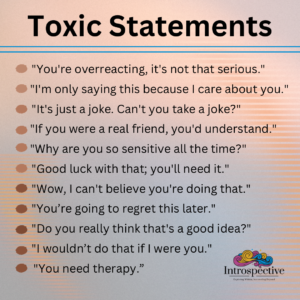
Here are some common signs:
- They Constantly Criticize You
A toxic friend will frequently judge your choices, lifestyle, or personality. This criticism may be framed as “helping” or “honesty,” but it ultimately leaves you feeling small or inadequate.
Example: You share your excitement about a new project, and they respond dismissively with, “That’s not going to work,” or “Are you sure you’re qualified for that?”
- They Guilt-Trip You
Toxic friends often use guilt to control you. If you make decisions they don’t agree with, they’ll try to make you feel bad, saying things like, “If you were really my friend, you’d listen to me,” or “I guess you don’t care about me anymore.”
- They Rehash the Same Issues
In a toxic friendship, unresolved issues are constantly brought up. Instead of moving on, they’ll remind you of past conflicts, making it impossible to heal or grow.
Example: Even after an apology, they repeatedly bring up something from years ago as though it just happened yesterday.
- They Use You to Meet Their Emotional Needs
Toxic friends expect you to be available for their emotional needs, often without reciprocating. You’re left feeling like an emotional dumping ground while they offer little support in return.
Examples include:
- Calling or texting you only when they need something but disappearing when you need help.
- Ignoring your boundaries, expecting you to always be available for their emotional crises.
- They Make Judgmental Comments
A toxic friend’s judgment often feels harsh and unconstructive. Their comments make you feel criticized rather than supported, often undermining your confidence.
- They Manipulate or Hide the Truth
Toxic people often hide information or manipulate situations to serve their own needs. They might withhold facts, twist the truth, or use you to get what they want, leaving you feeling used and betrayed.

- They Refuse to Take Responsibility
Toxic friends rarely take responsibility for their actions. Instead, they blame others, never owning up to their role in conflicts. This lack of accountability makes it impossible to resolve issues.

- They Display Fake Joy but Are Secretly Competitive or Jealous
Toxic friends can sometimes appear supportive on the surface, showing what seems like genuine joy for your accomplishments or happiness. However, underneath this exterior, they may harbor feelings of jealousy or competitiveness. This behavior can be subtle, but over time, you may notice patterns of insincerity.
Example: They might congratulate you on a promotion or new relationship but then follow up with passive-aggressive comments, like, “Wow, must be nice that everything is working out for you,” or “I could never do that; I just don’t have the kind of luck you do.”
In such cases, their “joy” feels superficial, and you may sense that they’re envious of your success. This hidden competitiveness can create tension, as they may subtly undermine or downplay your achievements, even while pretending to be happy for you.
Signs of Fake Joy and Hidden Jealousy:
- They quickly shift the conversation back to themselves after pretending to celebrate your success.
- They downplay your achievements by making backhanded compliments or comparing their own.
- Their mood or behavior changes noticeably when something good happens for you.
- You feel a sense of tension or unease despite their outwardly supportive words.
This kind of behavior can be especially hurtful because it feels like the emotional support you deserve is being withheld, replaced by a disguised sense of rivalry or resentment. Recognizing this pattern helps you understand the true dynamics of the friendship.
Why Do People Become Toxic?
Toxic behavior is rarely intentional, and many people who exhibit these traits are acting from a place of pain or unresolved issues. As a trauma-informed breathwork therapist, I understand that toxic behavior often stems from deeper wounds, such as:
- Lack of attention growing up: Many toxic individuals didn’t receive the emotional attention they needed in childhood. As a result, they develop unhealthy coping mechanisms to meet their emotional needs, often relying on manipulation or control.
- Fear of abandonment: Deep-seated fear of being left behind can cause toxic friends to sabotage relationships or push others away. They may create conflict as a way to test loyalty or to reinforce their control.
- Unprocessed trauma: Unresolved emotional trauma, especially from childhood, can manifest in defensive and harmful behaviors in adulthood. Rather than addressing their own pain, toxic individuals project their issues onto others, leading to toxic dynamics.
- Low self-esteem: People with low self-worth often bring others down to elevate themselves. They use criticism and judgment to make themselves feel better about their own insecurities.
- Difficulty with vulnerability: Toxic individuals often struggle with emotional intimacy, which makes it hard for them to be open and vulnerable. Instead of acknowledging their role in conflicts, they deflect blame onto others to avoid discomfort.
Understanding the root causes of toxic behavior doesn’t mean you should tolerate it. Instead, it allows you to approach these relationships with compassion while protecting yourself from harm.
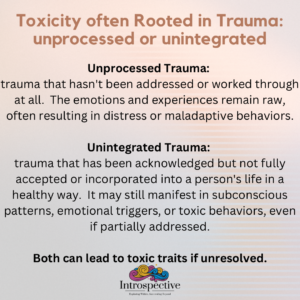
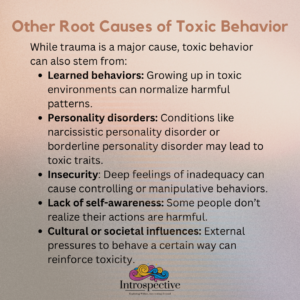
How to Protect Yourself from Toxic Friendships
Recognizing a toxic friendship is the first step, but protecting your peace requires action. Here are strategies to safeguard yourself:
- Don’t Give in to Their Drama
Toxic people thrive on drama and emotional reactions. They’ll provoke, manipulate, and test your limits to get a rise out of you. Stay calm, neutral, and non-reactive. Responding with composure and emotional neutrality takes away their power.
- Set Clear Boundaries
Boundaries are crucial when dealing with toxic friends. Don’t be afraid to say no, limit interactions, or distance yourself. Healthy boundaries send a message that you won’t tolerate manipulative or hurtful behavior.
- Limit Your Time with Them
If cutting ties is difficult, limit the amount of time you spend with them. Reducing contact helps protect your emotional energy and creates space for healing.
- Surround Yourself with Supportive People
Seek out friendships that are positive, uplifting, and mutually supportive. Building healthy relationships strengthens your emotional resilience and makes it easier to distance yourself from toxic dynamics.
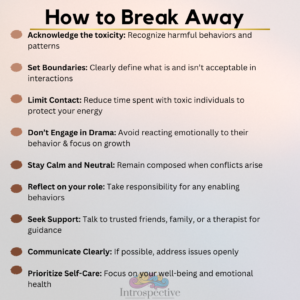
What to Do If You Can Relate to Toxic Traits
It’s important to recognize that nobody is perfect. If, after reading this, you see yourself in some of these toxic behaviors, that’s okay. Self-awareness is the first step toward growth.
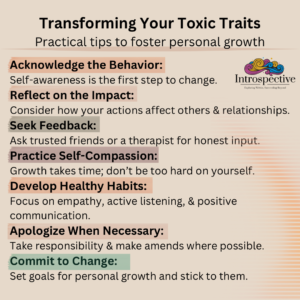
Here’s what you can do if you feel like you’ve exhibited toxic traits in your friendships:
- Acknowledge the Behavior
The hardest part of change is acknowledging that you might have toxic tendencies. But realizing that your actions are affecting others is a powerful step toward healing. Be honest with yourself and reflect on the patterns in your relationships.
- Seek to Understand the Root Causes
Toxic behaviors often stem from deeper wounds, like past traumas, insecurities, or emotional neglect. Explore what might be driving these behaviors. As a trauma-informed introspective breathwork therapist, I often see these patterns arising from unresolved pain. Understanding why you act this way can help you start the healing process.
- Take Responsibility
If you’ve hurt others, it’s important to take responsibility. This doesn’t mean being hard on yourself, but rather acknowledging your role in the relationship and being willing to make amends.
- Communicate with Friends
If you feel comfortable, have open and honest conversations with your friends about the behaviors you’ve noticed in yourself. Apologize where necessary and commit to working on your behavior. This level of vulnerability can strengthen your friendships.
- Work on Personal Growth
Commit to personal growth through therapy, self-reflection, or practices like breathwork. Building emotional awareness and practicing empathy can help break the cycle of toxic behavior and create healthier, more balanced relationships.
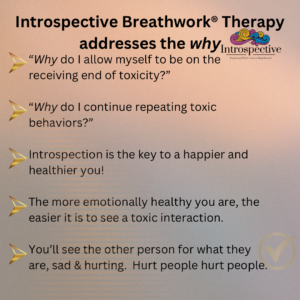
How Introspective Breathwork® Therapy Can Help
Toxic relationships, whether with friends or loved ones, can leave deep emotional scars. The damage they cause often runs beneath the surface, manifesting as anxiety, stress, self-doubt, and a loss of trust in yourself or others. That’s where Introspective Breathwork® Therapy can be a powerful tool for healing.
Breathwork is a practice that allows you to access deeper layers of your subconscious, helping you process and release stored emotions and trauma. In the context of toxic relationships, breathwork can help you:
- Release Emotional Blockages
Toxic relationships often cause us to suppress emotions like anger, frustration, or sadness. Breathwork allows you to tap into these stored feelings and release them in a healthy, therapeutic way, which can prevent them from manifesting as long-term emotional or physical issues.
- Reconnect with Your Inner Strength
When you’re caught in a toxic dynamic, it’s easy to lose sight of your own worth and power. Introspective Breathwork® helps you reconnect with your inner knowing, strength, and resilience. By accessing your true self, you can rebuild your self-esteem and regain your sense of empowerment.
- Heal from Trauma
For many, toxic relationships are deeply intertwined with past traumas. Whether it’s childhood neglect, abandonment, or emotional abuse, these early wounds can make you more vulnerable to unhealthy friendships. Breathwork therapy helps you heal these deep-rooted traumas, allowing you to break free from toxic patterns.
- Create Healthy Boundaries
Breathwork encourages introspection and self-awareness, giving you the clarity to recognize unhealthy patterns in your relationships. With this awareness, you can set clearer boundaries and make decisions that honor your emotional health.
- Restore Your Emotional Balance
Toxic friendships can throw your emotional equilibrium off balance. Through breathwork, you can restore a sense of calm, grounding, and emotional stability, helping you navigate challenging relationships with more ease and resilience.

Final Thoughts
Toxic friendships can be emotionally damaging, but by recognizing the signs and taking action, you can protect your peace. Remember, you deserve friendships that lift you up, not ones that weigh you down. Surround yourself with supportive, loving people and don’t be afraid to distance yourself from relationships that no longer serve your well-being.
If you’re struggling with the emotional fallout from toxic friendships, Introspective Breathwork® can be a powerful tool to help you heal, reclaim your strength, and create healthier connections.
And if you’ve recognized some toxic traits in yourself, there’s always room for growth. Take responsibility, seek healing,
